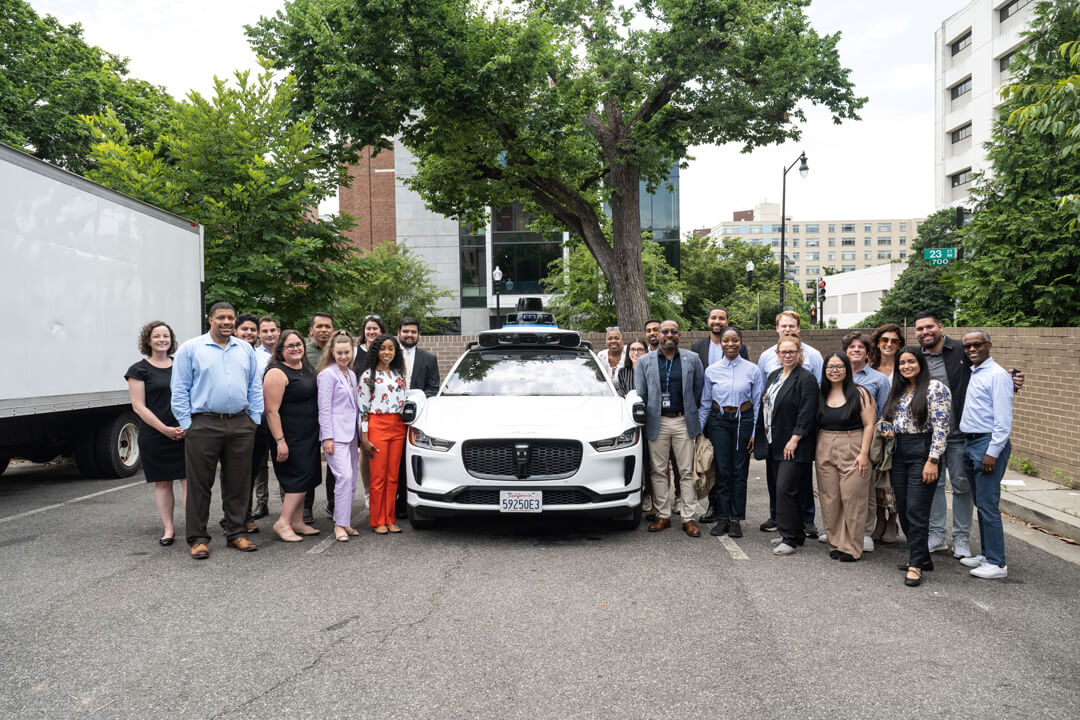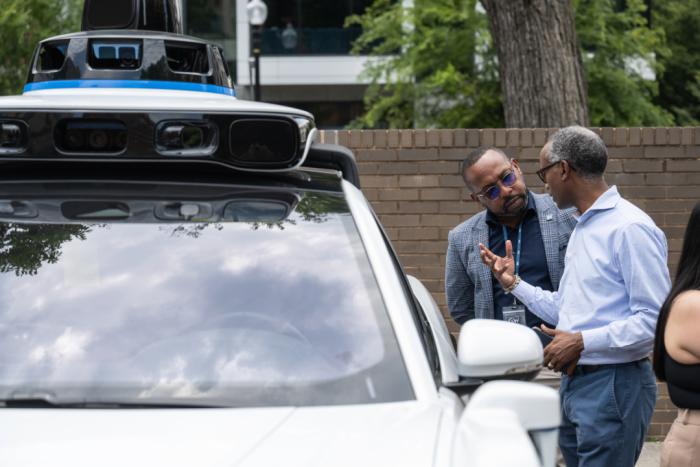Artificial intelligence and global learning form the core of a recent Global & Experiential Education course at the GW School of Business. Over four days this summer, graduate students enrolled in Business & Society: AI heard from guest speakers and delved into frameworks and analyses about AI and its future potential. Professor Thomas Debass, lecturer in strategic management and public policy, teaches the course. Debass also serves as managing director of the Office of Global Partnerships in the U.S. Department of State, a role he has held since 2016. In this capacity Debass leads public-private partnerships that advance foreign policy aims, many of them intended to promote entrepreneurship and innovation and each one requiring the interdisciplinary cooperation of business and society.
The goal of the course is for students to gain an overview of ways in which individuals and organizations can optimize and gain a competitive advantage by adopting artificial intelligence technologies. It is part of the Business & Society course series launched by Global & Experiential Education (G&EE) over ten years ago. The series examines the dynamics of business and society through the varying contexts, sociocultural, political, and economic, that businesses operate within.
Each year, the series explores a new topic, highlighting current issues and providing tools, frameworks and experiential learning opportunities that support students’ learning and career preparation. Guest speakers provide insights to students as experts and industry practitioners. This summer’s program on AI included meetings with three congressional staff, among them a chief counsel, a staff detailee who advises the U.S. Senate Committee on the Judiciary on matters related to artificial intelligence such as antitrust, cybersecurity, and intellectual property, and the lead staff member for AI matters for Democratic Leader of the U.S. House of Representatives, Hakeem Jeffries.
Additional speakers were the head of transportation analytics company TransitLabs, a foreign policy director from The Special Competitive Studies Project (SCSP), a think tank with a mission of ensuring the long-term competitiveness of the United States in the age of AI; the head of communications, marketing, and public affairs at Waymo, an autonomous vehicle company; and the head of government partnerships and ecosystems at Arm, a computer processing and software company.
Given the incredible access to experts and decision-makers, Business & Society Series courses are quite popular with GW students seeking a range of “Only at GW” experiences. Jason W. Fournillier, an online graduate student, made the decision to return to school following three decades of service in the private sector. He traveled from his home in Trinidad and Tobago to participate in the AI course this summer.
“The AI Business & Society program facilitated the acquisition of new skills, elevation of my credentials, expansion of my network, and attainment of personal and professional development,” Fournillier said. “The program was imparted in a manner that seamlessly integrated theoretical underpinnings with practical applications, equipping me well for my forthcoming pursuits. My sincere gratitude to GWU for this valuable experience.”
During the spring semester, G&EE held the Business & Society course Catalyzing Change: Blended Finance Strategies for Global Challenges, taught by Romi Bhatia, who is the senior advisor for diaspora partnerships in the U.S. Global Development Lab at USAID.
Era Andriambololona, a student in the M.S. in international business program who took the course, was also a member of the winning team in the International Finance Corporation (IFC) Impact Investing Challenge this year.
The team, which also included graduate students Anja de Waal, who studies international business, and Seth Amo-Nyarkoh, a graduate student in the Elliott School of International Affairs, competed against 190 teams from 93 universities globally. Their project was a proposal for a fund that would finance the transition of the seaweed farming industry to bioplastics manufacturing in Tanzania, Madagascar and South Africa. The project underscored the benefits of bioplastics as a more renewable and sustainable alternative to conventional plastics, and how the transition would empower women, who make up the majority of seaweed farmers in the region.
"I took the Blended Finance class because, as an aspiring impact investor, I wanted to deepen my understanding of the concept, why it matters and how it works,” Andriambololona said of the Business & Society Blended Finance class. “The one-week course, though intensive, was exceptionally rewarding.”
Andriambololona recalled how the class helped to prepare her for success in the IFC Impact Investing Challenge, through its interactive sessions, site visits to the U.S. International Development Finance Corporation and the Inter-American Development Bank, and the insightful lectures from Bhatia, as well as other experts from global blended finance organization Convergence, and USAID.
“This experience was invaluable when my team and I designed our innovative proposal for the IFC Impact Challenge 2024. The practical skills gained, coupled with the excellent feedback we received from the professor, set us up for success.”
G&EE Director Sarah LaRosa designs this course series with busy working professionals in mind. "The classes include virtual pre-program sessions to ensure students have familiarity with key concepts in order to make the most from the business visits and class sessions. The DC-based program is limited to four days, Wednesday through Saturday, to ensure students do not need to take too much time away from their other responsibilities in order to participate,” LaRosa said.
Business & Society Series classes also include a dinner to provide space for students to share their learnings and build deeper professional connections. It is a great opportunity for some of our distance students to travel to D.C. to visit campus, the U.S. Capitol, and connect face-to-face with GW classmates and faculty, LaRosa explained.
“Every semester we have one or two online students who travel to join us; however this year is the first time we've had an international online student come all the way to D.C. to participate.”




